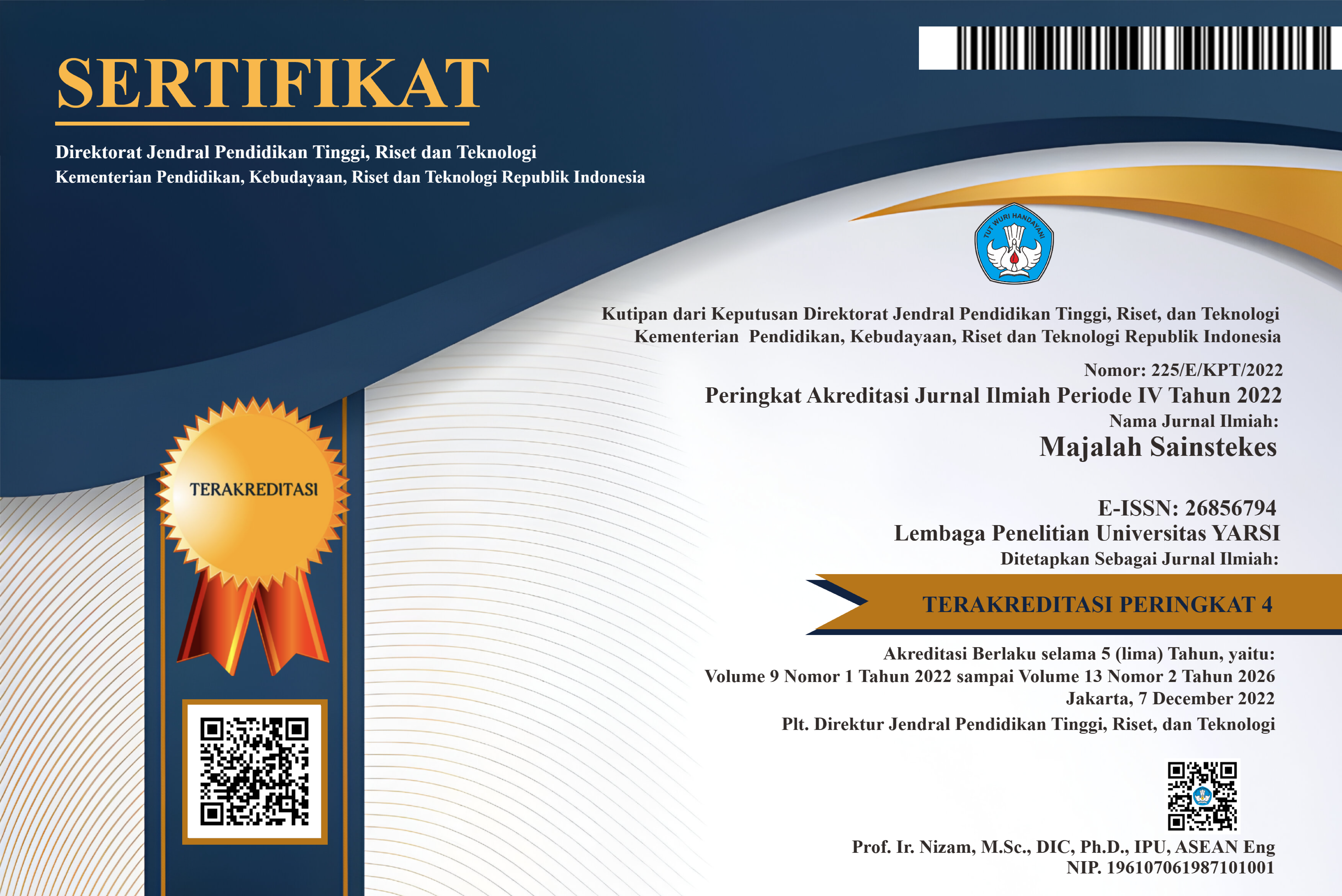Pengetahuan dan Sikap mengenai Infertilitas pada Mahasiswa Fakultas Kedokteran dan Fakultas Non Kedokteran Universitas YARSI
Keywords:
knowledge, attitude, infertility, students, genderAbstract
Infertility is a disease characterized by the failure to establish a pregnancy after 12 months of regular unprotected sexual intercourse. As the incidence of infertility increases, knowledge and attitude about infertility on students may decrease the incidence of infertility in the future. The aim of this study is to determine and compare the knowledge and attitude regarding infertility among YARSI University students based on their faculty and gender. This was an analytic study with cross-sectional design, which conducted on September until November 2016. The samples were using bachelor’s degree students from 2013 classes of YARSI University in total 86 respondents. Data were obtained by using questionnaire that has been validated. This study used univariate and bivariate analysis method.The results of this study showed that majority of students have moderate level of knowledge regarding infertility (46,5%) and good attitude towards infertility (97%). Significant difference was found in knowledge about infertility between faculties (p value 0,000; less than 0,05). While there was no significant difference in knowledge about infertility between genders with (p value 0,471; more than 0,05). Significant differences were also not found in attitudes regarding infertility between faculties with (p value 0,399; more than 0.05) and genders with (p value 0,083; more than 0.05). Based on the research results medical students have a better knowledge about infertility than non-medical student. Faculty affect the knowledge about infertility, but do not affect the attitude towards infertility. Meanwhile, genders do not affect both knowledge and attitude towards infertility. Thus, it is important to improve student’s knowledge and attitude regarding infertilityReferences
Abiodun, O., Alausa, K., Olasehinde O. 2016. Ignorance could hurt: an assessment of fertility awareness, childbirth intentions and parenting attitudes among university students. International Journal of Adolescent Medicine and Health, 2191-0278.
Azwar, S. 2015. Sikap Manusia Teori dan Pengukurannya, ed. 2, cet. 12. Pustaka Pelajar, Yogyakarta.
Borght, M.V., Wyns, C. 2018. Fertility and infertility: De?nition and epidemiology. Clinical Biochemistry 62, 2–10.
Chan, C.H.Y., Chan, T.H.Y., Peterson, B.D., Lampic, C., Tam, M.Y.J. 2015. Intentions and attitudes towards parenthood and fertility awareness among Chinese university students in Hong Kong: a comparison with Western samples. Human Reproduction, Vol.30, No.2 pp. 364–372.
Crawford, N.M., Steiner, A.Z. 2015. Age-related Infertility. Obstet and Gynecol Clin N Am 42, 15–25.
García, D., Brazal, S., Rodríguez, A., Prat, A., Vassena, R. 2018. Knowledge of age-related fertility decline in women: A systematic review. European Journal of Obstetrics & Gynecology and Reproductive Biology, 230, 109–118.
HIFERI, PEFITRI, IAIU, dan POGI. 2013. Konsensus Penanganan Infertilitas.
Khalil, N.S., Hassan, I.T., Saeed, H.D. 2015. Fertility Awareness among Medical and Non- medical Undergraduate University Students in Al-Iraqia University, Baghdad, Iraq. American Journal of Medical Sciences and Medicine, Vol. 3, No. 6, 74-78.
Mathews, T.J., Hamilton, B.E. 2016. Mean age of mothers is on the rise: United States, 2000–2014. NCHS data brief. United States; p. 1–8.
Meissner, C., Schippert, C., von Versen-Höynck, F. 2016. Awareness, knowledge, and perceptions of infertility, fertility assessment, and assisted reproductive technologies in the era of oocyte freezing among female and male university students. Journal of Assisted Reproduction and Genetics, pp 1-11.
Ribbons, H, Faraj, R. 2016. Infertility Awareness among UK University Students. J Gynecol Women’s Health, 1(2): 555556.
Rouchou, B., Forde, M.S. 2015. Infertility Knowledge, Attitudes, and Beliefs of College Students in Grenada. Science Journal of Public Health, 3(3): 353-360.
Siyez, D., M., Seymenler, S., Esen, E., Siyez, E., Ka?n?c?, Y., Baran, B., Öztürk, B. 2018. Investigating knowledge levels of university students about infertility. Turk J Urol; 44(2): 153-61.
Sørensen, N.O., Marcussen, S., Backhausen, M.G., Juhl, M., Schmidts, L., Tydén, T., Hegaard, H.K. 2016. Fertility awareness and attitudes towards parenthood among Danish university college students. Reproductive Health, 13:146.
Vuj?i?, I., Radi?evi?, T., Dubljanin, E., Maksimovi?, N., Gruji?i?, S. 2017. Serbian medical students’ fertility awareness and attitudes towards future parenthood. The European Journal of Contraception & Reproductive Health Care, 22:4, 291-297.
Yusuf, L. 2016. Depression, axiety, and stress among female patients of infertility; A case control Study. Pak J Med Sci. 32(6):1340-1343.
Zegers-Hochschild, F., Adamson, D., Dyer, S., Racowsky, C., de Mouzon, J., Sokol, R, et al. 2017. The International Glossary on Infertility and Fertility Care, 2017. Fertility and Sterility® Vol. 108, No. 3, 0015-0282.
Özerdo?an, N., Yilmaz, B. 2018. Turkish University seniors’ knowledge of and opinions on fertility and expectations of having children. Afri Health Sci 18(1): 172-179.

 Annisha Jehan Khaerunnisa
Annisha Jehan Khaerunnisa












